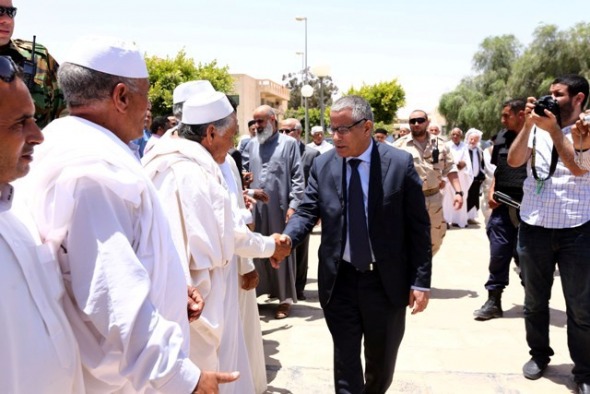By Umar Khan.

Tripoli, 10 June 2013:
Representatives from local councils from across Libya met for two days to discuss their work and . . .[restrict]the government’s impending plans to replace them with elected municipalities.
Gathering under the slogan, From Revolution to State , the event, organised by the Tripoli Local Council (TLC), took place on Saturday and Sunday in the capital.
The plan was to forward their recommendations to government officials. The organisers invited members of General National Congress (GNC) but the government had no formal representation indicating an growing distrust between it and local councils over the municipal electoral law under which local councils are to be abolished and replaced with new elected municipal authorities.
Speaking about the conference beforehand, Tripoli Local Council Chairman Sadat Elbadri said that it had been an effort to bring all the local councils across Libya together to talk about their work and problems they faced. He also said that the absence of government officials was a clear sign of discontent over inaction by government officials on several issues despite routine assurances.
The participants of the conference outlined steps to facilitate the upcoming handover to their replacements.
There were concerns about the government’s plans to hold elections for the new municipalities in the next few weeks.
“The law for municipalities doesn’t address all the issues. There is no point electing the local councils again without stating what are their established borders and their responsibilities – but he (Zeidan) is just pushing us for elections,” Elbadri told the Libya Herald.
He was referring to the fact that the government has so far not disclosed the boundaries of the new municipalities and shows no sign of doing so, despite expecting elections to them to be held. The government has also made it clear that until the new municipalities come into effect, there will be no funding for local government.
“In the current circumstances we are not able to do anything so it is better to hand it over to elected councillors and be over with it. Nothing can be done without budget and it doesn’t make sense to not allocate budget to us, we could have simple transferred the remaining budget to the next council and important work could have been done.”
Echoing Elbadri’s sentiments, the chairman of Misrata Local Council, Ismail Shakloun, said the lack of funding and weak central government were the reasons his council had not been able to fulfil its duties. The whole point of the conference was to talk about the problems they faced and how any future council can avoid them.
He agreed that the Local Government Law contained many flaws in its current form. If boundaries and the number of municipalities were not drawn up before the election, due in the next three months, there would be trouble in future. He also pointed to the plans for the maximum number of councillors in a city to be nine, and for those in a town with under 250,000 inhabitants to be seven.
“We raised objections many times, but nobody listened. The law is not practical. How can nine people represent one or two million people? Otman Gajiji [the head of the Central Committee for Municipal Council Elections] himself accepted this point but the push for elections is coming from the Prime Minister’s office. This interim government doesn’t have much time so I think they just want to finish this up quickly without thinking of its long term impact,” he told the Libya Herald. “Without funding, we can’t do anything but public want to see work done. So it is better to leave it to the elected people to tackle it when our hands are tied and we can’t do any work for the city.”
The first day of the conference saw representatives from different councils speaking about transparency, their work during the transition and post-transition phase, services provided under the emergency budget and how the transfer to the planned new municipalities n could be facilitated. This was followed by a workshop yesterday conducted with the help of civil society organisations. It focused on strengthening the institutions, the role of councils, the paving of the way to decentralisation and identifying the needs of the public. After the workshop, recommendations were forwarded to Congress and the government.
On the day the conference started, the Prime Minister along with the Interior and Health Ministers, had been on a tour of local councils in the far west of the country, visiting Zuara, Al-Jmail, Zultan, Rigdaleen, and Sabratha. The visit was cut short when he returned to Tripoli when news broke of the killing in Benghazi. [/restrict]







